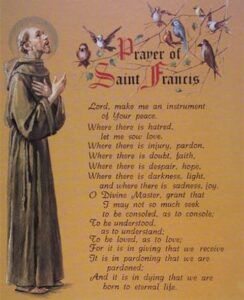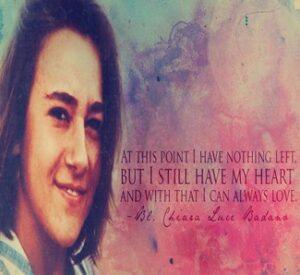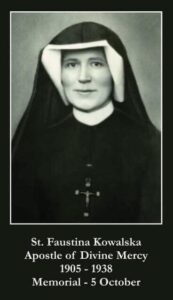October / Deireadh Fómhair
The Month of the Rosary / Mí na Corónach Mhuire
 How Are You Observing The Month Of The Holy Rosary?
How Are You Observing The Month Of The Holy Rosary?
The month of the Holy Rosary is October and this entire month is dedicated to the Rosary. The feast day of the Holy Rosary in particular is October 7th. The feast of the Rosary is held in memory of the glorious and triumphant victory at the battle of Lepanto in 1571. That battle was the most convincing military victory that proved without a doubt the great power of the Rosary.
The rosary is a living prayer form and continues to develop even in recent times. An invocation known as the Fatima Prayer was commonly added in the early 20th century. In 2002 Pope John Paul II added a new set of five reflections called the Luminous Mysteries which encourage additional meditations on the life of Jesus. The rosary is an invitation to experience the grace of Mary’s spiritual motherhood as she leads us to her Son, Jesus. For this reason, it has been an invaluable source of countless spiritual graces for the saints. The month of October is a good time to commit to praying the Rosary every day.
Archbishop Eamon Martin, Archbishop of Armagh and Primate of All Ireland has called for a Family Rosary Crusade against Covid-19 during the month of October.
“I invite families all over Ireland to pray the Rosary together at home each day for God’s protection during this time of Coronavirus”.
Archbishop Eamon is also inviting families to spread the word online. He said, “Using the #FamilyRosaryCrusade or #OctoberFamilyRosary hashtags please feel free to share a picture or a short sound clip of your family saying a “Hail Mary”, “Our Father” or “Glory Be”! on social media.”
For further information see:
http://www.how-to-pray-the-rosary-everyday.com/month-of-the-holy-rosary.html
https://www.thereligionteacher.com/the-month-of-the-rosary-is-october/
The Holy Father’s Intentions for the Month of October / Intinní an Phápa do Mhí Dheireadh Fómhair 2020
Pope Francis has recently entrusted his 2020 prayer intentions to the Pope’s Worldwide Prayer Network. They represent a wide array of challenges facing humanity and are the result of much prayer and discernment over the past several months. This month’s prayer intention is: The Laity’s Mission in the Church We pray that by the virtue of baptism, the laity, especially women, may participate more in areas of responsibility in the Church.
“The full, active participation and leadership of the laity, sacramentally mandated in baptism, is not a devolved power! At times there can be an erroneous “power-culture” in the church, presenting as clericalism or hierarchicalism, which is at odds with what we’re meant to be, all of us, in response to the One who came not to be served but to serve. So, together, let us pray!” (David Stewart, SJ.) https://www.popesprayer.va/popes-prayer-intentions-2020/
October 1st
 Feast Day of St. Thérèse of Lisieux / Féile Naomh Treasa as Lisieux
Feast Day of St. Thérèse of Lisieux / Féile Naomh Treasa as Lisieux
Today is the memorial of St. Thérèse of the Child Jesus and the Holy Face, more popularly known as “the Little Flower.” Shining brightly among the little ones to whom the secrets of the kingdom were revealed in a most special way is Therese of the Child Jesus and the Holy Face, a professed nun of the order of Discalced Carmelites. Therese of Lisieux is a young person. She reached the maturity of holiness in the prime of youth. As such, she appears as a teacher of evangelical life, particularly effective in illumining the paths of young people, who must be the leaders and witnesses of the Gospel to the new generations. During her life Therese discovered “new lights, hidden and mysterious meanings” and received from the divine teacher that “knowledge of love” which she then expressed with originality in her writings. She has made the Gospel shine appealingly in our time; she had the mission of making the church, the mystical body of Christ, known and loved.
https://www.catholicculture.org/culture/liturgicalyear/calendar/day.cfm?date=2020-10-01 https://www.catholicculture.org/culture/library/view.cfm?recnum=232
October 2nd
Feast of the Guardian Angels / Féile na nAingeal Coimhdeachta
Devotion to the angels is, at base, an expression of faith in God’s enduring love and providential care extended to each person day in and day out. Angels are servants and messengers from God. “Angel” in Greek means messenger. In unseen ways, the angels help us on our earthly pilgrimage by assisting us in work and study, helping us in temptation and protecting us from physical danger.
https://www.franciscanmedia.org/feasaint-of-the-guardian-angels/ https://www.catholicculture.org/culture/liturgicalyear/calendar/day.cfm?date=2018-10-02
October 2nd
International Day of Non-violence: Gandhi’s birthday. / Lá breithe Gandhi: Lá IdirnáisiúntaTiomanta don Fhrith – Fhoréigean
 “Non-violence is the greatest force at the disposal of mankind. It is mightier than the mightiest weapon of destruction devised by the ingenuity of man.” – Mahatma Gandhi
“Non-violence is the greatest force at the disposal of mankind. It is mightier than the mightiest weapon of destruction devised by the ingenuity of man.” – Mahatma Gandhi
Today we celebrate the birthday of a man who helped bring forward the notion of “non-violence,” and the tremendous impact this form of social response has had all over the world in the last century. On the International Day of Non-Violence, created by the United Nations in 2007, we look back on the influence of an Indian activist born Mohandas Karamchand Gandhi but known the world over as Mahatma Gandhi. The International Day of Non-Violence honours how Gandhi’s work and legacy has impacted global, non-violent protest. Gandhi’s commitment to India’s independence and his methods have been the cornerstone of civil and human rights initiatives all over the world. Put simply, Gandhi saw it as completely irrational to use violence to achieve peace, but rather, “just means lead to just ends.” This is a lesson we can all take to heart.
https://nationaltoday.com/international-day-non-violence/
October 4th
 Feast Day of St. Francis of Assisi / Féile Naomh Proinsias as Assisi
Feast Day of St. Francis of Assisi / Féile Naomh Proinsias as Assisi
Most people know Francis as a middle-ages ascetic who loved animals. The complete story is even more interesting. St Francis was born in 1181 in Assisi in Italy. In his youth, he spent money lavishly on fine clothes and having fun. He fell ill twice and then realised he was wasting precious time and that he should be serving Jesus instead. Often he gave his clothes and money to the poor and served the sick in hospital. He felt he should do more and went around in rags while fasting. His father was disgusted with his behaviour and took his inheritance from him. St. Francis had to depend on the kindness of people for food and shelter. He begged sinners to convert and return to God. He had the great power of working miracles. He loved all creatures and the animals obeyed his commands.
Francis’ final years were filled with suffering as well as humiliation. Praying to share in Christ’s passion he had a vision in which he received the stigmata, the marks of the nails and the lance wound that Christ suffered, in his own body. He died on October 4, 1226 at the age of 45. Francis is considered the founder of all Franciscan orders and the patron saint of ecologists and merchants.
October 5th
Sister Faustina was a young, uneducated nun in a convent of the Congregation of Sisters of Our Lady of Mercy in Poland during the 1930s. She came from a poor family that struggled during the years of World War I. She had only three years of simple education, so hers were the humblest tasks in the convent, usually in the kitchen or garden. However, she received extraordinary revelations — or messages — from our Lord Jesus. Jesus asked Sr. Faustina to record these experiences, which she compiled into notebooks. These notebooks are known today as the Diary of Saint Maria Faustina Kowalska, and the words contained within are God’s loving message of Divine Mercy.
Though the Divine Mercy message is not new to the teachings of the Church, Sr. Faustina’s Diary sparked a great movement and a strong and significant focus on the mercy of Christ. Saint John Paul II canonized Sr. Faustina in 2000 making her the “first saint of the new millennium.” Speaking of Sr. Faustina and the importance of the message contained in her Diary, the Pope called her “the great apostle of Divine Mercy in our time.”
Today, we continue to rely of St. Faustina as a constant reminder of the message to trust in Jesus’ endless mercy, and to live life mercifully toward others. We also turn to her in prayer and request her intercession to our merciful Saviour on our behalf.
https://www.thedivinemercy.org/message/stfaustina/
https://www.catholic.org/saints/saint.php?saint_id=510
October 5th
World Teacher’s Day / Lá Domhanda Tiomanta do Mhúinteoirí
 In 2020, World Teachers’ Day will celebrate teachers with the theme “Teachers: Leading in crisis, re imagining the future”. The day provides the occasion to celebrate the teaching profession worldwide, take stock of achievements, and draw attention to the voices of teachers, who are at the heart of efforts to attain the global education target of leaving no one behind.
In 2020, World Teachers’ Day will celebrate teachers with the theme “Teachers: Leading in crisis, re imagining the future”. The day provides the occasion to celebrate the teaching profession worldwide, take stock of achievements, and draw attention to the voices of teachers, who are at the heart of efforts to attain the global education target of leaving no one behind.
The COVID-19 pandemic has significantly added to the challenges faced by already over-extended education systems throughout the world. It is no exaggeration to say that the world is at a crossroads and, now more than ever, we must work with teachers to protect the right to education and guide it into the unfolding landscape brought about by the pandemic.
The issue of teacher leadership in relation to crisis responses is not just timely, but critical in terms of the contributions teachers have made to provide remote learning, support vulnerable populations, re-open schools, and ensure that learning gaps have been mitigated. The discussions surrounding WTD will also address the role of teachers in building resilience and shaping the future of education and the teaching profession.
https://en.unesco.org/commemorations/worldteachersday
October 7th
The Memorial of Our Lady of the Rosary / Cuimhneachán ar Mhuire na Corónach
“The whole purpose of the Rosary is to lead to this deep experience of Our Lady, who together with Jesus breathes the Spirit into us.”
October is the month in which Mary Most Holy, Queen of the Holy Rosary, is venerated. Pope John Paul II invited us to pray this Marian prayer, possibly every day, for peace, “so that the world can be preserved from the wicked scourge of terrorism.” This feast, focussed on the intercessory power of our Blessed Lady, was instituted by Pope Saint Pius V in thanksgiving for the great naval victory of a Christian fleet over the Turks at Lepanto on October 7, 1571, a favour widely attributed to intense recitation of the Rosary. Pope St. Pius V and all Christians had prayed the Rosary for victory.
In modern times successive popes have urged the faithful to pray the Rosary regularly, as a form of contemplative prayer focussed on the life of Christ. It calls prayerful attention to the saving mysteries of Christ and Mary’s close association with her Son in his mission. Pope St John Paul II called the rosary a “Christocentric prayer” containing the Gospel message in its entirety. The Rosary invites us to reflect on the great mysteries of the life, death and resurrection of Jesus.
https://www.thereligionteacher.com/the-month-of-the-rosary-is-october/
https://blog.franciscanmedia.org/franciscan-spirit/why-pray-the-rosary
October 10th
World Mental Health Day / Lá Domhanda Tiomanta do Mheabharshláinte
This year’s World Mental Health Day, on 10 October, comes at a time when our daily lives have changed considerably as a result of the COVID-19 pandemic. The past months have brought many challenges: for health-care workers, providing care in difficult circumstances, going to work fearful of bringing COVID-19 home with them; for students, adapting to taking classes from home, with little contact with teachers and friends, and anxious about their futures; for workers whose livelihoods are threatened; for the vast number of people caught in poverty or in fragile humanitarian settings with extremely limited protection from COVID-19; and for people with mental health conditions, many experiencing even greater social isolation than before. And this is to say nothing of managing the grief of losing a loved one, sometimes without being able to say goodbye.
The economic consequences of the pandemic are already being felt, as companies let staff go in an effort to save their businesses, or indeed shut down completely.
Given past experience of emergencies, it is expected that the need for mental health and psychosocial support will substantially increase in the coming months and years. Investment in mental health programmes at the national and international levels, which have already suffered from years of chronic underfunding, is now more important than it has ever been. This is why the goal of this year’s World Mental Health Day campaign is increased investment in mental health.
https://www.who.int/campaigns/world-mental-health-day/world-mental-health-day-2020
 The Big Event for Mental Health
The Big Event for Mental Health
On World Mental Health Day, the World Health Organization will, for the first time ever, host a global online advocacy event on mental health. At this event—the Big Event for Mental Health—world leaders, mental health experts and celebrity guests will join WHO Director-General, Dr Tedros Adhanom Ghebreyesus, to tell the world what we can all do to improve our mental health and how we can help make sure that quality mental health care is available to everyone who needs it. The event, will be streamed live on major social media channels. Follow the event on Facebook, Instagram, LinkedIn, Snapchat, Twitter and Tik-Tok to find out more.
October 15th
Feast Day of St. Teresa of Avila / Féile Naomh Treasa as Avila
St. Teresa of Ávila, a sixteenth-century Spanish saint and mystic, was very aware that every Christian has a role to play in making Christ present in the world. St. Teresa (1515-1582) was born in Avila and died in Alba, Spain. When only a child of seven, she ran away from home in the hope of being martyred by the Moors; in this way, she said she could come to see God. At the age of eighteen, she joined the Carmelite Order and chose Christ as her heavenly Spouse. With the help of St. John of the Cross, she reformed most of the Carmelite convents and founded new ones. She reached the highest degree of prayer and through prayer obtained such knowledge of divine things that in 1970 Pope Paul VI named her the first woman Doctor of the Church. This was a great honour, especially for a woman of her time. She was canonized in 1622.
https://www.youtube.com/playlist?list=PLfIV99jZo_dV_c4nHlqTkJZBdORfud2Ju http://education.dublindiocese.ie/st-teresa-of-avila/ https://www.catholicculture.org/culture/liturgicalyear/calendar/day.cfm?date=2018-10-15
October 16th
UN World Food Day / Lá Domhanda na Náisiún Aontaithe atá dírithe ar Sholáthar Bia
Grow, Nourish, Sustain. Together.
The COVID-19 global health crisis has been a time to reflect on things we truly cherish and our most basic needs. These uncertain times have made many of us rekindle our appreciation for a thing that some take for granted and many go without: food. Food is the essence of life and the bedrock of our cultures and communities. Preserving access to safe and nutritious food is and will continue to be an essential part of the response to the COVID-19 pandemic, particularly for poor and vulnerable communities, who are hit hardest by the pandemic and resulting economic shocks.
In a moment like this, it is more important than ever to recognise the need to support our food heroes – farmers and workers throughout the food system – who are making sure that food makes its way from farm to fork even amid disruptions as unprecedented as the current COVID-19 crisis. As countries begin to develop and implement COVID-19 recovery plans, it is an opportunity to adopt innovative solutions based on scientific evidence so they can build back better and improve food systems, making them more resistant to shocks. World Food Day is calling for global solidarity to help all populations, and especially the most vulnerable, to recover from the crisis. Our actions are our future.
World Food Day 2020 marks the 75th anniversary of the Food and Agriculture Organization of the United Nations (FAO) in an exceptional moment as countries around the world deal with the widespread effects of the COVID-19 pandemic. It’s a time to look into the future we need to build together. Make #WorldFoodDay your day – share our messages, your actions or develop an activity, even if it has to be virtual.
World Food Day 2020 toolkit for educators and youth available at: http://www.fao.org/documents/card/en/c/cb0423en
More information available at:
http://www.fao.org/world-food-day/theme/en/
October 17th
Saint Ignatius of Antioch /Naomh Iognáid as Aintíoch
St. Ignatius is one of the great bishops of the early Church. He was the successor of St. Peter as Bishop of Antioch. He was condemned to death by wild beasts during the Emperor Trajan’s persecution. On his way to Rome, he wrote seven magnificent letters, which we still have today, concerning the Person of Christ, his love for Christ, his desire for martyrdom and on the constitution of the Church and Christian life. His sentiments before his approaching martyrdom are summed in his word in the Communion antiphon, “I am the wheat of Christ, ground by the teeth of beasts to become pure bread.”
https://www.catholicculture.org/culture/liturgicalyear/calendar/day.cfm?date=2020-10-17
October 17th
International Day for the Eradication of Poverty / Lá Idirnáisiúnta atá Tiomanta do Dhíothú Bochtaineachta
 The annual United Nations International Day for the Eradication of Poverty (UN Day) 17 October is a day to express friendship and solidarity with people who must live with poverty and social exclusion every day of the year in Ireland, Europe and around the world. The theme for 2020 is: “Acting together to empower children, their families and communities to end poverty”
The annual United Nations International Day for the Eradication of Poverty (UN Day) 17 October is a day to express friendship and solidarity with people who must live with poverty and social exclusion every day of the year in Ireland, Europe and around the world. The theme for 2020 is: “Acting together to empower children, their families and communities to end poverty”
This year marks the 30th anniversary of the adoption of the Convention on the Rights of the Child (UNCRC) on 20 November 1989. This landmark human rights treaty sets out the civil, political, economic, social and cultural rights of every child, regardless of their race, religion or abilities.
In particular, the Convention recognizes the right of every child to a standard of living adequate for the child’s physical, mental, spiritual, moral and social development. Poverty hurts children’s development and, in turn, leads to lower income and health in adulthood. When child poverty is recognized as a denial of children’s human rights then people in positions of responsibility and power are legally bound to promote, protect and fulfil children’s rights. Above all, it is imperative to recognize and address the specific discriminations experienced by the girl child.
October 18th
European Day against Human Trafficking / Lá Eorpach i gCoinne Mangaireachta Dhaonna
This day is an opportunity to raise awareness with senior cycle students about trafficking in human beings. Trafficking is a global problem, driven by poverty, and all forms of trafficking are a gross violation of human rights. Many countries, including Ireland, have specific laws to deal with trafficking. For further information and excellent resources there are two outstanding groups working against human trafficking. They are:
- RENATE: Religious in Europe Networking Against Trafficking and Exploitation https://www.renate-europe.net/
- APT: Act to Prevent Trafficking https://www.renate-europe.net/
Pope Francis reminds us that slavery “is not something of other times,” and that “no one can wash their hands of it without being, in some way, an accomplice to this crime against humanity.” https://thepopevideo.org/human-trafficking/ http://w2.vatican.va/content/francesco/en/speeches/2013/december/documents/papa-francesco_20131212_credenziali-nuovi-ambasciatori.html
October 18th
Feast of St. Luke, Evangelist / Féile Naomh Lúcás, Soiscéalaí
St. Luke, the inspired author of the third Gospel and of the Acts of the Apostles, was a native of Antioch in Syria and a physician, and one of the early converts from paganism. He accompanied St. Paul on a considerable part of his missionary journey. He was also his companion while in prison at Rome on two different occasions. His account of these events, contained in the Acts, is first-hand history. Luke’s Gospel is, above all, the Gospel of the Merciful Heart of Jesus. It emphasizes the fact that Christ is the salvation of all men, especially of the repentant sinner and of the lowly. Today, especially during these difficult days of the pandemic, ask your students to pray for doctors and those who care for the sick, through the intercession of St. Luke, who is patron of physicians.
https://www.catholicculture.org/culture/liturgicalyear/calendar/day.cfm?date=2020-10-18 https://www.catholic.org/saints/saint.php?saint_id=76
October 20th
Mission Sunday / Domhnach na Misean
The Congregation for the Evangelization of Peoples has now confirmed that World Mission Day, this year, will be observed as usual on the penultimate Sunday of October. “In many dioceses,” the Congregation noted, “the preparation for World Mission Day has been underway for some time and the missionary animation of the People of God remains pre-eminent.”
“Faith, in fact, by its very nature, is missionary and the celebration of World Mission Day serves to keep this essential dimension of the Christian faith alive in all the faithful.”
Pope Francis released his message for this year’s celebration, based on theme taken from the Book of Isaiah, “Here am I, send me”, the Pope’s message says that the Covid-19 pandemic is an opportunity for mission and service to others.
World Mission Day, or Mission Sunday, was instituted by Pope Pius XI in 1926, to remind Catholics about their commitment and support to the missionary work of the Church through prayer and sacrifice.
October 22nd
St. John Paul II / Naomh Eoin Pól 11
Today we celebrate the feast day of St. John Paul II the great defender of life and the family of our times. The Church has chosen to celebrate his feast not on the date of his death which was on April 2nd, 2005 but on the anniversary of his formal installation as Universal Pontiff on October 22nd, 1978.
St. John Paul’s words offer consolation to us, even more in these challenging times, than ever before.
Pope John Paul II sometimes called Saint John Paul or John Paul the Great, born Karol Józef Wojtyła; (18 May 1920 – 2 April 2005), was the head of the Catholic Church from 16 October 1978 to his death in 2005. He was the second longest-serving pope in history. As a Pole, he was the first non-Italian pope in 455 years. The last non-Italian pope was Pope Adrian VI, who died in 1523.
He is the first ever pope to visit the White House, and a mosque. He travelled more than any other pope before him, visiting many of the countries of the world. He is also famous for starting the annual World Youth Day. After he was beatified, his title was changed to Blessed John Paul II. John Paul II was canonized by Pope Francis on April 27, 2014 which means that the Polish Pope is now known as Saint John Paul II.
https://www.catholic.org/saints/saint.php?saint_id=6996
October 28th
St. Jude & St. Simon / Naomh Símón agus Naomh Iúd
Today the Church celebrates the feast of Saints. Simon and Jude whose names occur together in the Canon of the Mass and are also celebrated on the same day. Possibly this is because they both preached the Gospel in Mesopotamia and Persia where it is said they had both been sent, but in actual fact we know nothing for certain about them beyond what is told us of their being called as Apostles in the New Testament. St. Jude is the author of a short Epistle which forms part of the New Testament.
https://www.catholicculture.org/culture/liturgicalyear/calendar/day.cfm?date=2017-10-28
https://www.franciscanmedia.org/saints-simon-and-jude/
October 29th
 Blessed Chiara Badano / Ciara Badano, Beannaithe
Blessed Chiara Badano / Ciara Badano, Beannaithe
Sometimes we’d prefer that our lives be a story than the one God seems to be writing. In our fragile existence it doesn’t take much to turn a romance into a drama, or an adventure into a tragedy. Briefly, the story of Chiara Badano—an only child conceived after 11 years of marriage, who died at 18 after a bout with a painful form of bone cancer—looks like an empty tragedy, but not from the perspective of the Divine Author.
Chiara seemed to have everything going for her as a teen. She had a loving, holy family and a rock-solid faith that was nurtured by retreats and youth ministry programs. She was popular amongst her friends and was liked by boys. It’s not hard to see why. She was beautiful. Chiara loved to hang out in coffee shops. She was great at tennis, swimming and mountain climbing. Her outgoing personality and adventurous spirit made her dream of becoming a flight attendant. Chiara Badano was a modern teenager: She liked to sing, dance, play tennis and skate. She was a member of the Focolare Movement, founded in Italy by Chiara Lubich in 1943. Chiara had a bright life ahead of her. One day while playing tennis, Chiara experienced excruciating pain in her shoulder. Shortly afterwards she was diagnosed with osteogenic sarcoma. She watched her bright future slip away. But it’s here that the real story of her life begins—the story of heroic virtue. This is a beautiful and inspiring story to share with your students.
Chiara is now Blessed Chiara Badano (the step before becoming a Saint). She was beatified on 25th September 2010. Her feast day is celebrated on 29th October. She is blessed because of the good life she led and because of a miracle that happened through her prayers. Read her story and share her story with your students through a power point presentation and resources:
http://education.dublindiocese.ie/october-calendar-resources/ https://www.catholic.org/news/hf/faith/story.php?id=38409





